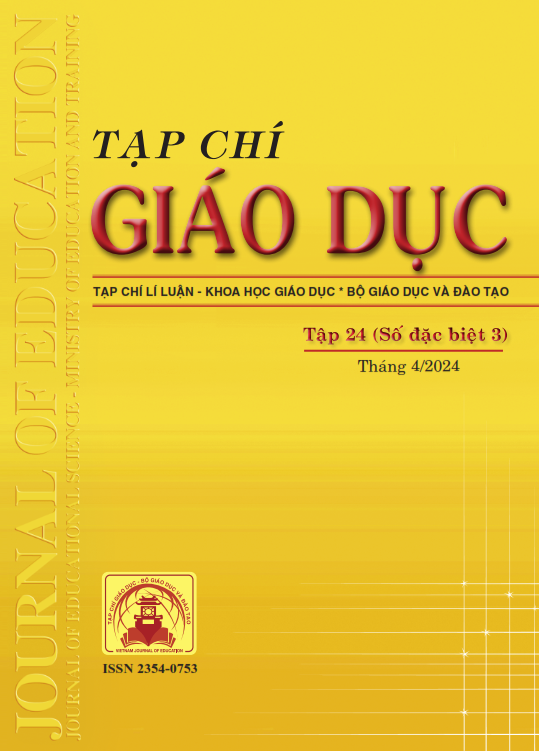Tác động của hành vi công dân trong tổ chức đến giáo viên trung học cơ sở ở Thành phố Hồ Chí Minh
Tóm tắt
Organizational citizenship behavior (OCB) is considered secondary, voluntary, work-related behavior. As the needs and demands of learners continually change and update in today's reality, teachers' willingness to go beyond their duties will create change, bringing success to schools. Through a convenient sample survey method with an inherited scale and validity test, this article addresses the impact of middle school teachers' organizational citizenship behavior on their colleagues, department and school. Research results show that middle school teachers' civic behavior positively impacts the atmosphere of the department and school, the principal's support, and the student's sense of happiness at work of middle school teachers. Therefore, consideration should be given to replicating and developing the implementation of organizational citizenship behavior of middle school teachers.
Tài liệu tham khảo
Bateman, T. S., & Organ, D. W. (1983). Job satisfaction and the good soldier: The relationship between affect and employee “citizenship”. Academy of Management Journal, 26(4), 587-595.
Belogolovsky E., & Somech, A. (2010). Teachers’ organizational citizenship behavior: Examining the boundary between in-role behavior and extra-role behavior from the perspective of teachers, principals and parents. Teaching and Teacher Education, 26(4), 914-923. https://doi.org/10.1016/j.tate.2009.10.032
Chandrasekaran, S. (2019).The Role of OCB and its Relationship with Competency and Commitment with Mediating Role of Performance. The International Journal of Business and Management Research, 9(1), 2-6.
Del Junco, J. G., Espasandin Bustelo, F., Dutschke, G. M. J., & Palacios Florencio, B. (2013). An approach to the design of a scale for measuring happiness at work of Iberian companies. In Athens: ATINER'S Conference Paper Series, No: SME2013-0855.
Dipaola, M., & Tschannen-Moran, M. (2001). Organizational citizenship behavior in schools and its relationship to school climate. Journal of School Leadership, 11(5), 424-447.
DiPaola, M. F. (2012). Conceptualizing and validating a measure of principal support. P.B. Forsyth. Contemporary Challenges Confronting School Leaders (pp. 111-120). Charlotte, NC: Information Age Publishing, Inc.
George, J. M., & Brief, A. P. (1992). Feeling Good-Doing Good: A Conceptual Analysis of the Mood at Work-Organizational Spontaneity Relationship. Psychological Bulletin, 112(2), 310-29. https://doi.org/10.1037/0033-2909.112.2.310
Hanif, A. F. (2004). Analisis dan perencanaan sistem informasi:Untuk keunggulan bersaing perusahaan dan organ-isasi modern. Yogyakarta: Andioffset.
Jimmieson, N. L., Hannam R. L., & Yeo, G.(2009). Teacher organizational citizenship behaviours and job efficacy: Implications for student quality of school life. British Journal of Psychology, 101(P3), 453-479.
Junru, X., & Huang, Y. J. (2019). The influence of teachers’ perceived organizational justice on organizational citizenship behavior in chinese private universities: mediate role of job satisfaction. The International Journal of Organizational Innovation, 12(1), 295-303.
Lê Thị Minh Loan, Nguyễn Thị Anh Thư, Hà Thị Minh Chính (2021). Hành vi công dân trong tổ chức của giảng viên các trường đại học Việt Nam. Tạp chí Tâm lí học, 1, 31-43.
Mangkunegara, A. P. (2000). Manajemen sumber daya manusia perusahaan. Bandung: Remaja Rosda Karya.
Oplatka, I. (2006). Going beyond role expectations: Toward an understanding of thedeterminants and components of teacher organizational citizenshipbehavior. Educational Administration Quarterly, 42(3), 385-423. https://doi.org/10.1177/0013161X05285987
Organ, D. W. Podsakoff, P. M., & MacKenzie, S. B. (2006). Organizational citizenship behavior: Its nature, antecedents, and consequences. USA: Sage Publications, Inc Psych 761 White Paper.
Organ, D. W. (1988). Organizational Citizenship Behavior: The Good Soldier Syndrome. Lexington Books, Lexington, MA.
Podsakoff, N. P., Whiting, S., Podsakoff, P., & Blume, B. (2009). Individual- and organizational-Level consequences of organizational citizenship behaviors: A meta-analysis. Journal of Applied Psychology, 94(1), 122-141.
Strzałkowska, A. G. (2017). School as an institution, organization, social system. International Journal of Pedagogy Innovation and New Technologies, 4(2), 58-66. https://doi.org/10.5604/01.3001.0011.5892
Đã Xuất bản
Cách trích dẫn
Số
Chuyên mục
Giấy phép

Tác phẩm này được cấp phép theo Ghi nhận tác giả của Creative Commons Giấy phép quốc tế 4.0 .












